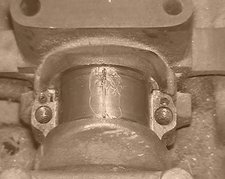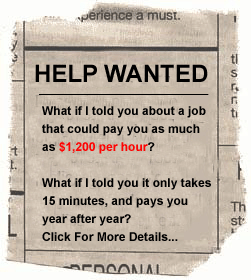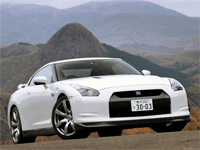July 10th, 2009
Question:
I have a 98 Jeep Grand Cherokee w/ approx. 219K mi. When I start it up it takes 15 to 30 seconds before the oil pressure gauge comes up to about 40#. After it runs for a while (5 to 10 min) the oil pressure drops to zero, and in another 5 to 10 min (idling) I start to hear light valve knock. Is it the oil pump or main bearing wear? Is there a way to determine which?
Answer:

Probably a little of both. No way but to remove the oil pan and measure the bearings by removing a bearing cap and using plastigauge to measure bearing clearances. Its almost as much work to get to the oil pump, so its worth investigating the bearings while you are there. I would suggest that if the bearings are within spec, replace the oil pump and consider yourself lucky to get another 50,000 – 75,000 miles from the engine. If the bearings are out of spec, I would look into a rebuilt or used engine from a reputable source like www.gotengines.com.
Permanent link to this post (183 words, 1 image, estimated 44 secs reading time)
Posted in Engine | No Comments »
July 8th, 2009
Question:
Hey my question is when i go to start my vehicle i get nothing. Car is a 1996 Oldsmobile Cutlass ciera SL With a 3.1 Liter V6. Engine does not turn over. And starter does not turn over. I am wondering how to find out if its the solenoid or starter or possibly the relay for the ignition.
Please respond asap.
Thank you for your assistance
Answer:
First step is to pull the battery out and test that. Make sure it has a full charge, and then use a battery load tester to check condition of the battery. Most garages and auto parts stores have a battery tester.
I would also check both battery terminals and cables to make sure you have a good connection. Cables can corrode from the inside and create problems. I have seen more starting issue due to cables, than a bad starter or solenoid.
Assuming that the battery and cables checks out, you can jump the terminals on the solenoid to see if the engine turns over. If it does, then there is a problem in the ignition switch or safety system (brake switch, or neutral/park safety switch)
Posted in Electrical | No Comments »
July 8th, 2009
Question:
Hey I drive a used 2000 Chevy Camaro which I purchased a few days ago. It drives very well other than 2 problems. The first is a humming noise that comes from the rear of the car when I am parked. If I rev the engine up, somtimes it goes away.
The other question is about a very very subtle bumping noise when I am breaking from the rear. It is so subtle that it could be the breaks rubbing,but sometimes it does it when i am slowing down without breaking. I know both of these may seem small, but as a new owner of this used vehicle every little thing sticks out to me.
Can you help me??
Thanks,
Wally
Answer:
Wally,
Sounds like something loose in the exhaust system, probably causing
both issues you are having. The exhaust system is hung from the
chassis with rubber bushings providing for a little bit of movement,
and noise reduction. These rubber pieces wear out over time and need
to be replaced. You can take it to an exhaust shop and let them look
at it, or simply turn up the tunes a little and forget about it ! If
it were me, I would use the problem as an excuse to the wife to get a
new performance exhaust system.
Permanent link to this post (223 words, estimated 54 secs reading time)
Posted in Exhaust | No Comments »
July 7th, 2009
Question:
I own a 96 Chevy Cavalier and the breaks are bad, the pads are still good, we removed the air from the line, and it has great vacuum what else could be wrong?
Answer:
The master cylinder could be bad. How did you remove the air from the lines? With modern ABS systems, its usually best to use a pressurized or vacuum bleeder to make sure all the air is out. The old crack the bleeder and have a buddy push the pedal does not work as well as it used to. I would take it to a shop that has the proper bleeding equipment and have them get all the air out, if its still bad, then its more than likely the master cylinder.
Permanent link to this post (128 words, estimated 31 secs reading time)
Posted in Brakes | No Comments »
July 7th, 2009
Question:
Hey Kevin,
I have a 2001 Audi A4 Quattro and I recently changed the rear pads. I bought Wagner brake pads which where the more expensive of the choices and now have a persistent squealing noise from the right rear pads. which occurs while driving and goes away when I brake and comes right back when I let off the brakes. I tried to sand the calipers and applied never seize and special spray lube but nothing seemed to work. Any suggestions would be great.
Answer:
When you changed the pads, did you screw in the caliper pistons, or just use a clamp to push the piston back in? On the Audis the piston must be screwed back into the caliper. Its possible there is not enough room for the pads to back off the rotor, it may be rubbing while the brakes are not applied. Also I dont know what you sanded on the caliper, but you may have damaged the caliper depending on how much and where you sanded it down. As with any brake job, cleaning the calipers and rotors is critical to no squeaks and should only be done with a spray on brake cleaner. ( no abrasives !)
Permanent link to this post (206 words, estimated 49 secs reading time)
Posted in Brakes | No Comments »













